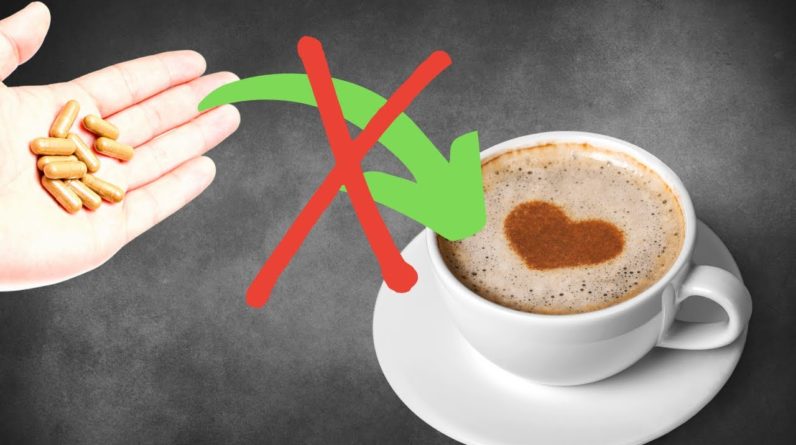
What medications should you not take with coffee? 7 drugs were examined Coffee is one of the most popular drinks in the world. Coffee has become such a staple in our culture that the term coffee break is part of our vernacular. According to uptodate.com, more than 150 million people in the United States drink coffee daily and the developed world accounts for more than 70% of global consumption. Given these numbers, it is worth examining whether drinking coffee could interfere with the absorption of medications. Let's find out! Drinking coffee is now part of our morning routine, and it's part of mine, too. And you might be asking yourself oh if I drink coffee why don't I take in my meds. what's the harm Once you have coffee, your body begins to process and according to medicalnewstoday.com, "Caffeine levels peak in about 15-45 minutes." You may be asking yourself how long does coffee stay in my body.
The half-life of coffee is about 5 hours. What does it mean? This means that if you drink 10 mg of caffeine, 5 mg will still be in your body after 5 hours. Now this means that half of the coffee you drink is not eliminated from your body in a linear fashion, so the effects of caffeine last longer before they are eliminated from your body. What affects the absorption of coffee? Three things: 1) an enzyme system called cytochrome P450 2) coffee stimulates the secretion of stomach acid in your stomach 3) coffee is a stimulant and increases bowel motility and all in turn actually how some medications are absorbed and the three points I mentioned before.
What common medications you should be aware of: 1) Thyroid medications: Thyroid medications should be taken on an empty stomach in the morning. If you drink coffee, this will affect the absorption of the medicine. Not only does caffeine increase intestinal motility , but it also has a mild laxative effect by increasing the amount of fluid in the stool. Caffeine also causes the medicine to move quickly through your intestines, which reduces the amount of medicine that is absorbed. As a result, this will affect the amount of medication needed to treat your underlying thyroid condition . 2) Medicines to treat osteoporosis: The bisphosphonates you see listed here are medicines used to treat bone health. However, these medications should not be taken with coffee. In fact, it should not be taken with juice, milk, or any other beverage other than plain water. Furthermore, you should wait 30 minutes before taking medications or other supplements. This is because oral bisphosphonates are poorly absorbed, and drinks such as coffee or when taken with food will create complexes that interfere with gastrointestinal absorption.

3) Acid reflux medications: Here is a list of medications that help treat acid reflux. • dexlansoprazole (Dexilant) • esomeprazole (Nexium) • lansoprazole (Prevacid) • omeprazole (Prilosec, Zegerid) • pantoprazole (Protonix) • rabeprazole (Aciphex) These medications work by decreasing the amount of acid secreted in the stomach to help relieve your heart burn symptoms if If you are interested in the side effects of Omeprazole which is a common drug for reflux, click here. 4) Iron Tablets: Do not take iron tablets or supplements with coffee. This is because coffee can affect absorption from both your food and supplements if taken at the same time. When should you drink your coffee? It is recommended to drink coffee an hour before a meal or take it as a supplement. 5) Ciprofloxacin: (quinolone antibiotics) Ciprofloxacin is a popular antibiotic and is used to treat a variety of ailments such as urinary tract infection, skin infections, and bronchitis to name a few. If you are taking this antibiotic, do not take it at the same time as products that contain caffeine. Using both together can increase the effects of caffeine and can increase heart palpitations, anxiety, nervousness, and drowsiness.
6) Sudafed (pseudoephedrine) Sudafed is a decongestant and is usually a symptom of help associated with nasal congestion. If you are taking Sudafed (pseudoephedrine) the caffeine can increase side effects such as fast heart rate and high blood pressure. Remember that caffeine is also found in tea, cola, some herbal supplements, and chocolate 7) Medications used for asthma are called beta-adrenergic agonists such as albuterol: This is because caffeine can stimulate your heart, and medications like albuterol can stimulate your heart, too. Taking them together can overstimulate your heart which can exacerbate the side effects of these medications: If you made it this far in the video that's great and thanks for the commitment. I will list other medications, albeit less common ones that can interfere with coffee. Adenosine, birth control pills, clozapine, Persentine, estrogens, Luvox, lithium, monoamino oxidase inhibitors, tricyclic inhibitors, pentobarbital, theophylline, verapamil, diuretics. If you are interested in other videos click here or here Think about your health and have a good day..







